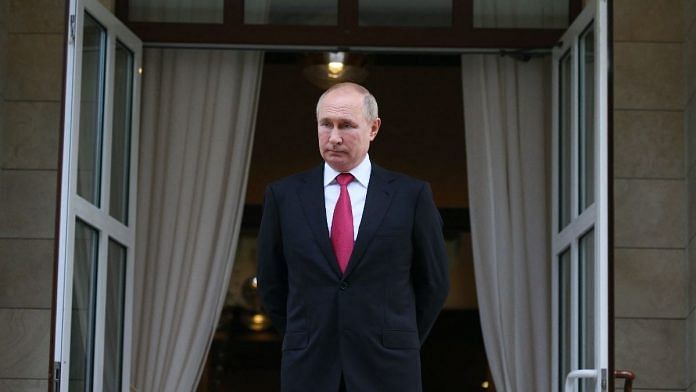Donning a green T-shirt instead of his usual suit, Ukrainian President Volodymyr Zelenskyy told the world he is “target No. 1” in a video address Friday as Russian forces advanced on Ukraine’s capital Kyiv.
On the other side of the battlefield, however, was his opponent, Russian President Vladimir Putin, sitting in the comfort of the Kremlin, extending his hospitality and taking part in photo ops alongside visiting Pakistani Prime Minister Imran Khan, as though the military conflict in Ukraine was only occurring in the background.
This isn’t to say that Putin is not bothered by the crisis in Ukraine or treating it with minimal attention — if anything, he’s got a barrage of sanctions issued by the US and other Western powers to deal with.
Rather, Putin seems to have a calm, coldness about him despite being responsible for ushering the world into the “darkest hours since World War II” just as it was starting to recover from the Covid-19 pandemic. More so because he promised to withdraw troops just a week ago but went back on his word and deployed forces into two breakaway regions in eastern Ukraine after recognising them as “independent states”.
The Ukraine crisis has certainly shone the spotlight on Putin, whose recent actions reflect an intention to restore the ‘glory’ of the Soviet Union even if by brute force and diplomatic bluffs. This is why Vladimir Putin is ThePrint Newsmaker of the Week.
Also read: China’s drawing lessons from Russia-Ukraine. It also believes in ‘sphere of influence’ theory
Restoring Soviet glory
At a meeting Tuesday in the Kremlin, Putin assured Azerbaijan President Ilham Aliyev that he does not plan to restore Russia’s empire. “We predicted speculation that Russia plans to restore (its) empire within imperial borders…This absolutely does not correspond with reality,” he said.
Look at the wording of this statement: “Russian empire” and not the “Soviet Union”.
In a message the day before, after signing a decree to officially recognise the ‘independent’ people’s republics of Donetsk and Luhansk, Putin made the bizarre assertion that “Ukraine was entirely created by Russia, more precisely, Bolshevik, communist Russia”. Would it be far off to say the former KGB foreign intelligence officer stopped short of saying: ‘We created them and we can take them back’?.
Any basic history textbook will tell you that the Ukrainian capital, Kyiv, served as the centre of the first Slavic state, Kievan Rus, which existed from the late 9th to the mid-13th century, under the reign of the Rurik dynasty. It was in fact the birthplace of both Ukraine and Russia.
In the following centuries, Ukraine was ruled by successive powers, including Poland-Lithuania — known as the Kingdom of Poland and the Grand Duchy of Lithuania that reigned for three centuries till the 17th century. Much of Eastern Ukraine was controlled by Tsarist Russia from the 17th century, and the rest of the country from the 18th century.
More so, the Ukrainian Soviet Socialist Republic was a founding member of the Soviet Union in 1922. It would gain independence in 1991, upon the dissolution of the Soviet Union.
Some experts say Putin’s vision to resurrect the Soviet Union, however, might be flawed. According to Madeleine Albright, former US secretary of state, his actions in Ukraine could bolster a more United Western alliance.
“Instead of paving Russia’s path to greatness, invading Ukraine would ensure Mr. Putin’s infamy by leaving his country diplomatically isolated, economically crippled and strategically vulnerable in the face of a stronger, more united Western alliance,” wrote Albright in an op-ed for The New York Times.
Also read: Ukraine invasion won’t hit Putin’s popularity in Russia but it’s hardly sustainable
Putin’s actions a reflection of his own mischief
In essence, Russia’s invasion of Ukraine reflects a former super power flexing its military might, almost reminding the world: ‘Hey, I’m still here. I’ve got hard power.’ It clearly takes the heat off Washington’s other foe and perhaps Russia’s closest ally right now: China, which has been under the scanner over the origins of Covid-19, allegedly committing human rights abuses in Xinjiang and other issues.
Both the Donald Trump and Joe Biden administrations have been tough on China but there’s a clear distinction when it comes to Russia. Biden has had no qualms pointing the finger directly at Moscow, saying “Putin chose this war”, while his predecessor called the 69-year-old autocrat a “genius” for recognising the two breakaway states in eastern Ukraine.
Lest we forget the debacle over former US national security adviser Michael Flynn – the first person in Trump’s inner circle of government who quit in 2017 following intelligence leaks that he secretly discussed sanctions with the Russian ambassador to Washington and then tried to cover up the conversations. Trump was silent then. He even defended Russia over claims of interference in the 2016 presidential election, raising questions about the very sanctity of the US electoral system.
All in all, Trump has had a soft spot for the Russian president. So did former Ukrainian President Viktor Yanukovych, whose decision to withdraw from a deal for greater integration with the European Union in November 2013 sparked protests and sowed the seeds for Russia’s invasion of Ukraine the following year.
Therefore, it wouldn’t be a stretch to say that Putin has faced discomfort with these new leaders, who don’t exactly shower him with praise.
Putin has certainly made Russia out to be a mischievous global player, and not a world leader with both military prowess and soft power. It’s a reflection of his own antics from allegedly spying on the US election, ‘poisoning’ Kremlin critic Alexei Navalny and even feeding his own people with propaganda and riding-a-horse-shirtless photo ops to maintain his image as a strongman.
Views are personal.
(Edited by Prashant)



